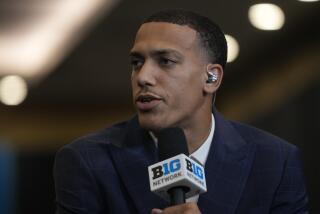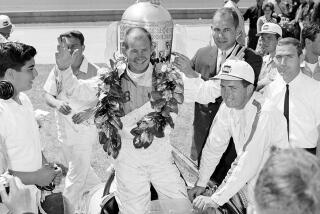Ricky Johnson Is Riding High : Motocross Racer Has Earned Close to $500,000 This Year
- Share via
Ricky Johnson wasn’t exactly a dropout in 1982. It’s just that when it was time for his senior year to start at Valhalla High School in El Cajon, he didn’t bother to go back.
He was too busy riding his motorcycle.
Johnson was 17 and had just signed a contract for $18,000 to ride a 250cc Yamaha motocross bike on weekends.
“The school had put in a new rule that if you missed too many classes, no matter what your grades, you couldn’t graduate,” Johnson recalled. “I knew I was going to miss a lot of Fridays and Mondays, so there didn’t seem much sense staying in school.”
Four years later, Johnson still doesn’t have a high school diploma, but don’t feel too sorry for him.
This is only June, not yet halfway through 1986, and Johnson has already earned close to $500,000 riding a Honda motocross bike. Not many in Valhalla’s Class of ’83 can match that.
“There’s a couple of teachers I’d like to see right now,” he said. “One of them tried to make an example of me, telling everyone that I’d never get anywhere, just because I had long hair and rode a bike all the time. Another one told me that all I’d ever get from riding a motorcycle is hurt.”
Johnson has already clinched both the national 250cc championship and the Nippondenso Supercross series, winning a $100,000 bonus for each.
Before riding a race this season, he got a signing bonus of approximately $200,000 from Honda. The Japanese factory also pays him $10,000 for each victory. He won four of the five 250cc races and has won five of 11 in Supercross for another $90,000.
The El Cajon youngster, who won’t be 22 until July 6, can collect another $10,000 bonus tonight by winning the Coors Superbowl of Motocross at the Coliseum, which starts at 8.
Johnson also will have a shot at a third $100,000 bonus when the national 500cc season starts next month. With defending champion Broc Glover, also from El Cajon, hurting from a twice-broken wrist, Johnson will be a strong favorite in the big-bike series.
So, there are no regrets about not taking that final year in school. If Johnson has a regret, it’s that he missed an $80,000 bonus that same year by only three points.
“The money’s great, but it’s not everything,” he said. “I also get all my clothes, my transportation and my living expenses, and I’ve seen the world at the same time.”
He would like to do with motorcycling what Danny Sullivan has done with auto racing--become a recognizable commodity. Toward that end, he is coming out with his own line of clothing. El Cajon is a suburb of San Diego, a bedroom community of about 80,000, but it has produced four world-class motocross riders in Glover, Johnson, Ron Lechien and Scott Burnworth.
Johnson believes it is only a coincidence.
“People are always asking me if Broc was a big influence on my riding,” he said. “I don’t think so. We don’t ride together, except at races, more than a couple of times a year.
“When Broc first left El Cajon to race in the nationals, I was only 12, riding in races around home, so we weren’t together then. If Broc has had any influence, it’s his life style. I’ve admired the way he is good to kids, isn’t into drugs or stuff like that and is a wholesome person. I hope I’m the same.”
Riding motorcycles has been a way of life for Ricky Johnson since he was 3.
“My Dad had an old Harley when he was in the Navy back in Corpus Christi before I was born. He used to call it Sinbad.
“When I was 3, he bought my sister Laurie a minibike, and I went nuts over it. I pestered her so much that Dad went down to Sears and bought me a little 1 1/2-horse cycle with training wheels.
“The next thing I got was my sister’s minibike, and from then on, every time I got big enough or strong enough to ride something faster, I got it.”
By 7, he was racing competitively, and he won his first race at 9 on an 80cc bike.
“My family has backed me 100% all the way,” Johnson said. “Even when I dropped out of school, they felt it was the right move at the time. My Dad was a painter, he’s semi-retired now, but he couldn’t have been more supportive.”
Since he won his first national event in 1982, Johnson has been ranked with the best in the world, but it took two setbacks to get to the No. 1 ranking he holds today.
One was a bruised body, the other a bruised ego.
In St. Louis, in the summer of ‘83, Johnson was riding with a 102-degree fever when he flipped over the handlebars, suffering a dislocated hip.
“I’ve never hurt like that in my life,” he said. “I would go through having a couple of broken bones once a week, a leg or hand or shoulder, before I’d want a dislocated hip. There’s nothing that compares with it. I felt like I never wanted to race again, it hurt so bad. Most guys, when they get an injury like that, they never ride as well as they did before.”
Determined to come back, Johnson worked harder than he had ever worked in his life to prepare for the 1984 season.
He won 4 of 10 national 250cc events and clinched his first championship with a win at Washougal, Wash. Later that year, he teamed with Jeff Ward, David Bailey and Johnny O’Mara to win the Motocross de Nations, an international team event considered the Olympics of motocross racing.
“I hate to talk about 1985,” he said. “I had the No. 1 plates and I thought it would be easy to win again. I didn’t train much, and I suffered from what I call the champion syndrome.
“I proved the point for the guy who said it was tougher to stay on top than it is to get there. When the year ended, I felt like I had got something and lost it.”
He finished third in the national 250cc class and fourth in the stadium races.
“That’s not bad if you’re climbing to the top, but it looked pretty bad to me after being No. 1. I was pretty low.”
And determined again.
Johnson’s contract with Yamaha expired at the end of 1985, and he was about to sign a new one when a Honda representative asked him to try their bike.
“I tested last November on a training track near Carlsbad, and when I finished the test, I wondered why Team Honda hadn’t won every race. I couldn’t wait to sign with them. I even took $25,000 less, but I’ve more than made up for that.”
Johnson also credits his mechanic, Brian Lunniss, and team manager, former world champion Roger DeCoster, for helping him achieve such a remarkable season.
“If any one thing has hurt me it’s that I’m sort of a loner at heart,” he said. “I like to be by myself a lot, and that’s hard to explain to your mechanic, your girlfriend, your parents, your fellow riders or the press.” Johnson’s girlfriend, incidentally, is Laura Muncey, stepdaughter of the late Bill Muncey, unlimited hydroplane racing’s most famous driver.
“With Lunniss and DeCoster, we have a good line of communication, and that’s been a big help,” he said.
“It’s funny about wanting to be alone. If you’re nobody, and not winning, they just call you moody, and it’s OK. But if you’re successful, they call you stuck up. I figure I’m the same either way. I just like time to be by myself.”
This year, Ricky Johnson has spent a lot of time by himself--out in front of the pack.
More to Read
Go beyond the scoreboard
Get the latest on L.A.'s teams in the daily Sports Report newsletter.
You may occasionally receive promotional content from the Los Angeles Times.










